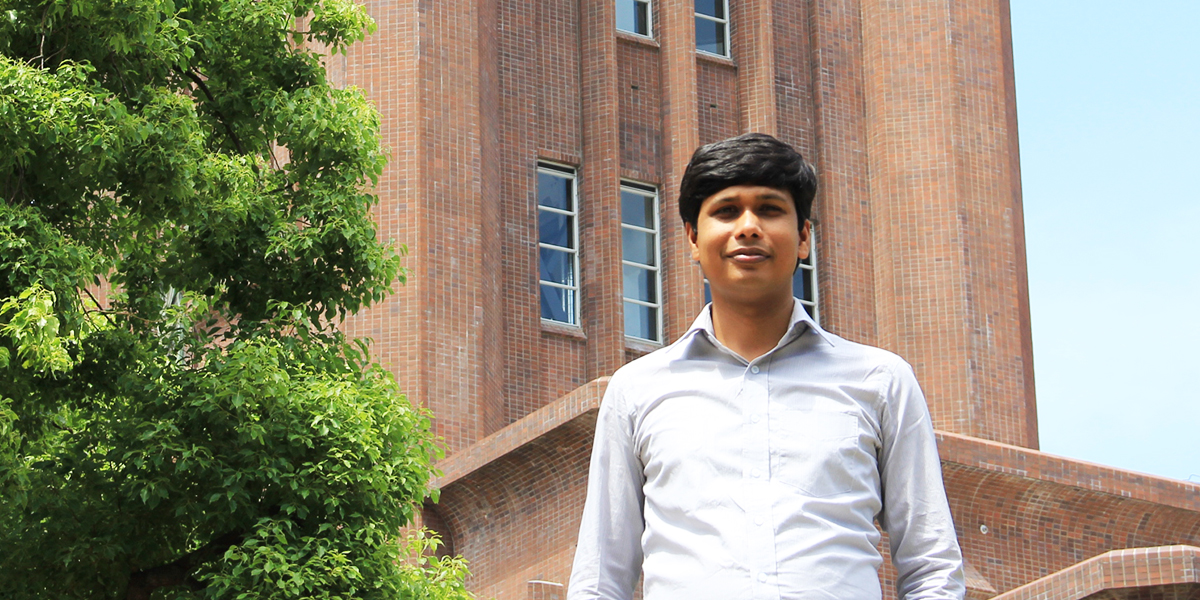
Government Official Takes Educational Leave to Study at UTokyo
-
- Mohammad Iqbal Hossain
- Master's degree student, Graduate School of Public Policy (International Program)
Areas of Study: Public finance, taxation policy
Country/Region of Origin: Bangladesh
I Knew I Wanted to Study Abroad
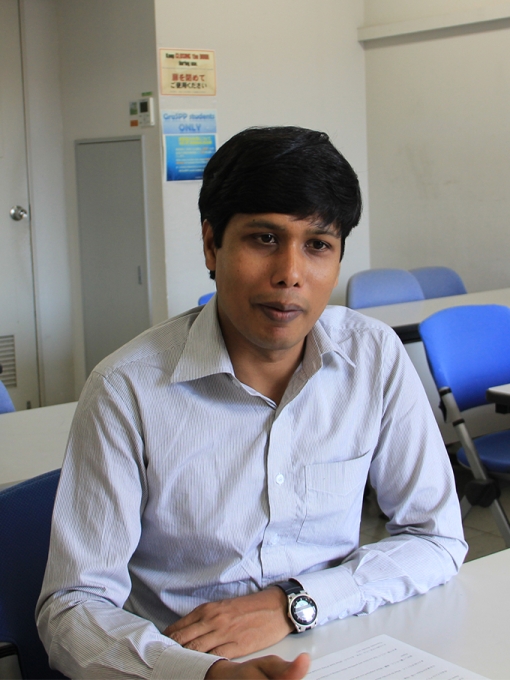
After obtaining a bachelor’s and Master’s degree in economics from a university in Bangladesh, I joined my country’s Ministry of Planning to work as a government official. As the culture of my institute vigorously encourages staff to acquire a Master’s or Doctoral degree from an overseas university, I was already planning to go and study at a graduate school in another country.
Prompted by a visit from a UTokyo professor
One day, Professor Sawada from the Graduate School of Economics of the University of Tokyo visited our office and told us about the programs in the Graduate School of Public Policy (GraSPP). Later, from my colleague who stayed in Japan for months to conduct collaborative research with Professor Sawada, I heard that GraSPP offers an excellent program that is taught in English. This made me decide to apply for that program. I also applied for and was accepted by the Japan-IMF Scholarship Program for Asia (JISPA), a scholarship for government officials from Asian countries. In Bangladesh, we are taught about Japan in school since childhood, and I learned a lot about the Japanese economy and culture in high school and university. So I was quite familiar with Japan and knew that the University of Tokyo is the number one university in Asia. That’s why I eventually made up my mind to enroll in GraSPP.
Before coming to Japan
When applying for JISPA, I prepared a research proposal, recommendation letters and a copy of my English test scores. After I passed the application screening, I had to participate in an interview in Bangladesh. By the way, JISPA has four partner universities in Japan—the National Graduate Institute for Policy Studies (GRIPS), Hitotsubashi University (HIT), the International University of Japan (IUJ), and GraSPP of the University of Tokyo—and applicants have to list the universities they want to go to in order of priority. I chose only GraSPP and did not list any of the other three universities. Every year, JISPA sends 2-3 professors representing the selection committee, which consists of professors from the four universities, to Bangladesh to interview applicants. In the year when I applied, three professors came but no one came from GraSPP. I wondered why no professor came from GraSPP even though that was the only school of the four that I had applied for. The three professors asked me why I chose only the University of Tokyo, which was kind of embarrassing (laughs). At last, I passed the interview and received a scholarship to go to GraSPP. Around that time, I also gained admission into the University of Oslo in Norway. I decided to enroll in GraSPP instead because the conditions of JISPA are better, and also because through online research I discovered that GraSPP offers a lot of opportunities for me to interact with government officials from Asian countries.
I visited the University of Tokyo website and researched about how I should prepare for studying abroad before leaving Bangladesh. I realize now that I should have studied Japanese more seriously, but things work out in Tokyo even if you cannot speak Japanese that much. I also had to be mentally prepared before coming to Japan, a country with totally different customs, cultures and food from my own. One of my more senior coworkers told me that the Japanese are very strict about time and advised me to submit assignments by their deadlines.
Right after arriving in Japan, I participated in a workshop in Niigata. It was a two-and-a-half month workshop operated by JISPA. About half of the participants were JISPA-sponsored overseas students and the remaining half were Japanese employees from private companies. We lived together and learned a lot from each other. We also did a lot of activities together, including making presentations. Through these experiences, I was able to make friends with both overseas students in other universities and Japanese workers; the workshop was a very good place to network.
My Goals are to Research Taxation and Contribute to Society by Proposing a Better Taxation System
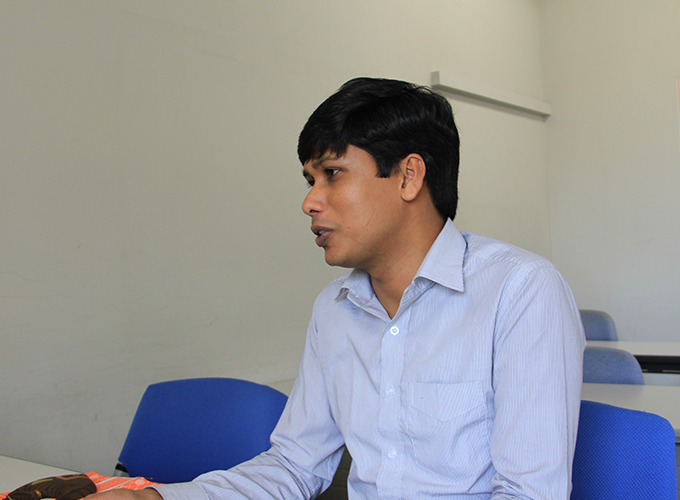
After joining GraSPP, I have had a lot of opportunities to attend classes that bring in many guest lecturers, including high-ranking government officials and diplomats from Japan, the US and Europe. For example, in a course that invites guest speakers from the Ministry of Economy, Trade and Industry (METI), I can hear directly from Japanese government officials about situations the Japanese economy is facing in real time. These classes are interactive, and lecturers can also hear from students who are government officials in their home countries. Also, many classes offer special study trips to other countries. For example, I participated in a study trip to Singapore, the Philippines and Indonesia last summer (2014) and was able to listen to valuable experiences about economic development from high-ranking officials of the World Bank, the ADB, AMRO, IRRI, JICA and officials from the Singaporean government. This spring (2015), I joined a study trip through a course called Health Technology Assessment in which we went to the National Institute for Health and Clinical Excellence (NICE), the Office for Health Economics (OHE), the London School of Hygiene and Tropical Medicine in the UK and the ESSEC Business School, SANOFI and the French National Authority for Health (HAS) in France. During this trip, I had the opportunity to learn about administrative decisions concerning the distribution of medical drugs and insurance coverage.
I want to contribute to society through research on public policy
Currently, I am researching taxation policy and investigating why the tax-to-GDP ratio is low in Bangladesh. Countries with low tax-to-GDP ratios cannot make appropriate plans for economic development and have to rely on official development assistance (ODA) from other countries. Accordingly, countries that receive ODA are susceptible to intervention from the countries that provide it. In the case of my home country, the fortification of the Bangladeshi economy is a prerequisite for the proposal of appropriate economic development scenarios. Therefore, I have explored reasons why the tax-to-GDP ratio is low by comparing taxation systems in Bangladesh with those in 51 other developing countries. As GraSPP features professors with expertise in public policy in developing countries, as well as fellow students from developing countries, there are ample opportunities for me to seek advice, share information and receive feedback. This makes GraSPP a very useful environment for my research. Through my research, I came to understand that there may be two interconnected reasons behind Bangladesh’s low tax-to-GDP ratio: the low capacity utilization of the Bangladeshi economy, and the fact that the government is not efficient in collecting taxes. My goal is to propose more appropriate tax systems based on my findings. It will make me happy if I can contribute to the elimination of poverty and enhance development by introducing more reasonable tax systems.
My post-graduation plans
After graduating from GraSPP, I have to return to my job at the Ministry of Planning. I took a two-year paid educational leave from the Ministry on the condition that I go back to work after graduation (otherwise, I would have to pay back the salary I received while abroad). After working at the Ministry for a year, I want to apply for a Doctoral program in the same field I'm currently researching in. I am thinking of perhaps obtaining a Doctoral degree from an Australian university. I heard that GraSPP is planning to offer a Doctoral program starting next year (2016), so coming back to GraSPP would also be good. As all of the professors and lecturers at GraSPP, including my supervisor and sub-supervisor, are very helpful, I want to learn from them again in the future. My long-term goal is to contribute to the development of the Bangladeshi economy, particularly the development of better tax systems, by utilizing my knowledge and the expertise that I am now acquiring.
Life in Japan and My Impressions of Tokyo and UTokyo
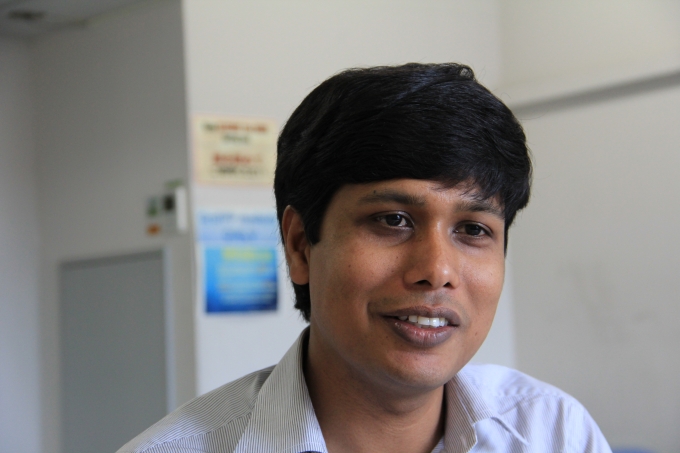
Since coming to Japan and being exposed to a different culture, I have become more sensitive to diversity and widened my perspective. For those who intend to make policy proposals, being open-minded and knowing the reality of another country is advantageous. In this regard, I don’t regret that I took a two-year educational leave to come to UTokyo. It didn’t disadvantage me in the least to put my career on hold for a short while.
That being said, I felt surprised and shocked almost every day when I came to Japan for the first time. For example, I noticed that nobody talked on the train. Some played video games, and others read books, but nobody spoke at all. This was quite strange to me, since we speak on public transport all the time in Bangladesh. I was similarly amazed when I saw people trying to avoid physical contact on the crowded commuter trains in the morning. Another thing that surprised me at first was the fact that doors in Japan open towards the outside. In Bangladesh, all of our doors open towards the inside. I also experienced a kind of culture shock when I witnessed an old man who had fallen onto the street in Ikebukuro. People passing by would call out to him, asking things like “Are you all right?” But nobody dared to reach out and help him to his feet. This was quite shocking to me because in Bangladesh, everybody naturally lends a hand to those in need. Now I understand that this can be attributed to Japanese culture, in which non-intrusiveness and an appropriate sense of distance are valued highly. Recently, I have been learning a lot from the Japanese who always care about the feelings of others, and my way of thinking has changed greatly.
I think I should have studied Japanese more…
I haven’t faced any major problems in Tokyo due to not being able to speak very much Japanese. Sometimes, however, it takes time to receive service in English. If you know basic Japanese, things go more smoothly because you can communicate with the locals one way or another. In my case, for the first six months after coming to Japan, GraSPP appointed a Japanese tutor (a 2nd-year Japanese student from the program in which I was enrolled) who gave me advice on life in general, as well as on academic matters. By the way, some buildings on the Hongo Campus do not have English names on them. Initially, this was confusing to me. When I wanted to visit a professor at the Graduate School of Engineering, I had to ask several people which building was the one where that professor’s office was. Because we have only a ten-minute break between classes, it’s troubling when we don’t know which buildings are which. As many students from developing countries are not accustomed to reading maps, even campus maps are not of much help. After about three months, however, we get used to the campus and are able to find our way around it.
As for my classes, I have no problems at all because the courses in my program are all taught in English. Speaking of classes, I remember one piece of advice I received from a senior colleague at the Ministry in Bangladesh. He told me that when I go to Japan I should not interrupt teachers by asking them questions when they are speaking. In Bangladesh, students and teachers engage in quite energetic debate, but he said this is not the case in Japan. In GraSPP, however, students always ask questions during class, and I think it’s great that the classes here are so interactive. Almost 60 percent of students in the GraSPP program are Japanese, and I can communicate with them in English. As I said before, I can’t speak much Japanese and have difficulty in conversing with Japanese students in Japanese.
I play cricket with friends on weekends
Almost every weekend, I get together with several people from Bangladesh and India to play cricket. I like playing cricket with friends, and just getting together with them is fun. Another thing I like to do for fun is watch Hollywood and Bollywood movies. I do not watch Japanese movies, but I like Japanese dramas. To name one in particular, I avidly watched Oshin (a famous rags-to-riches Japanese drama about a female entrepreneur). I like it because it depicts how industrious Japanese people were in the past.
My advice for people who are planning to study in Japan
When I decided to study in Japan, some people were uncertain about my choice. But I am really glad that I decided to study here at UTokyo. My first piece of advice for prospective students is that you have to prepare your research proposal well in advance. Also, as you are required to understand English well, you need to make sure you achieve high scores on your English proficiency tests. My second piece of advice is that if you are planning to do a part-time job in Japan, you have to study Japanese seriously because a certain level of Japanese is necessary to get a job. Moreover, if you want to work in Japan after graduation, you have to perform well academically and have good command of Japanese. My last piece of advice is a warning (laughs): if you think that Japanese universities are easy places to graduate from, you will find out you are sorely mistaken. If you want a degree, you are going to have to study hard!
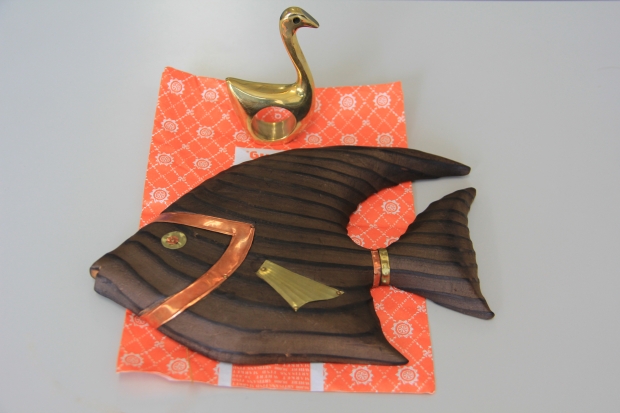
Helping to Bring People out of Poverty
Handicrafts
Iqbal brought us two lovely gifts from Bangladesh. These are handicrafts made by people in poverty, particularly by women in poor farm villages, as part of a microfinance project by Aarong, an entity operated by BRAC (an NGO) that helps to bring people out of poverty. The fish (made of mangrove wood, copper and bronze) is made to resemble a rupchanda, a famous saltwater fish in Bangladesh that is prized by fishermen since it can be sold at a high price. Meanwhile, the beautifully hand-crafted bronze swan is a decorative figure, Iqbal says.
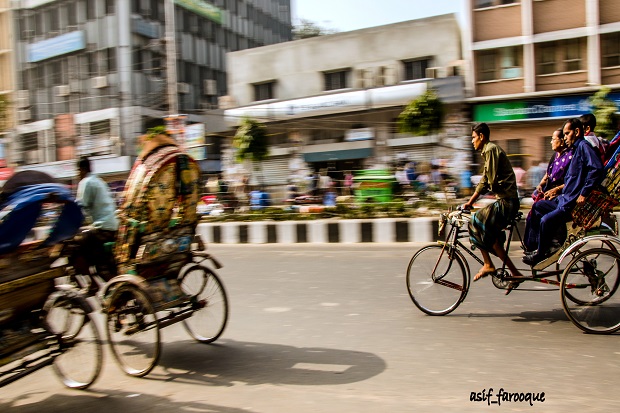
Captivating Characteristics of Bangladesh
Hospitality and Rickshaws
Iqbal tells us that the Bangladeshis are full of hospitality and welcome visitors warmly. Particularly in the countryside, people are willing to give food to visitors even if they have little food for themselves. One defining characteristic of Iqbal’s hometown, the Bangladeshi capital Dhaka, is its abundance of rickshaws. He explains that local people often use rickshaws for short-distance travel within the city because they’re cheap.





